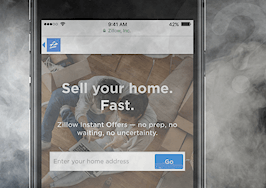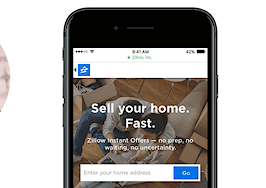- Predictably, some believed this product is evidence that Zillow is inserting itself into the real estate transaction.
- Others worried about the effect that Instant Offers could have on areas where investor activity is already higher than normal.
- And some welcomed the chance to get a CMA in front of sellers and disrupt other potential disruptors, like Opendoor.
Earlier today, Inman broke the news that Zillow was launching an “Instant Offers” platform — allowing homeowners to connect with investors and sell their homes quickly, with or without a real estate agent.
Instant Offers allows prospective sellers to receive all-cash offers from a group of 15 large private investors; sellers will also receive a side-by-side comparative market analysis (CMA) from a local Zillow Premier Agent.
The response from the industry was swift. Here’s a summary of what Inman readers had to say about the new product.
‘Zillow is finally becoming a brokerage’
It didn’t take long for Inman readers to see a broken promise in this announcement from Zillow — namely, the promise that the company would never become a brokerage.
“And the other shoe drops,” said Drew Peterson, a North Carolina-based real estate consultant. “Zillow has always claimed it doesn’t want to be a brokerage. It doesn’t have to be when it can connect buyers and sellers without the hassle of the legalities of brokerage ownership/licensure.
“Uber disrupted the taxi industry without owning or operating a single taxi. It simply connected people who wanted rides with people who could offer them.
“Zillow is now doing that with buyers and sellers. It’s including agents for now and only working with large investors, but how long will that last?” concluded Peterson.
Zillow Group’s director of industry engagement, Jay Thompson, took issue with that stance.
“We’re not becoming a broker. To be a broker, we’d need brokerage licenses,” Thompson said, noting that the company doesn’t hold active broker licenses in Nevada or Florida and that in those states, brokers must collect compensation for broker services, which Zillow doesn’t do.
“We’re not collecting fees/compensation, we’re not hiring agents, we’re not getting brokerage licenses, we’re not taking listing agreements, we’re not driving buyers around and showing houses, we’re not doing anything that agents and brokers do every day to run their business,” Thompson added.
He also noted that right now, Instant Offers is still “a test,” and that it will include agents “for as long as the test runs, and it will continue to include agents if the test is expanded.”
‘The more, the merrier’
“I’m not worried about this model,” said Becky Boomsma, an agent and marketing director in Oakland, New Jersey. “While expediting options for some buyers and sellers can be a significant benefit, it’s not for everyone, especially when it comes to their return on investment and holding out for the best opportunities. For now, there will still be the majority of consumers that feel safer or more confident in the traditional model that they know and understand involving real estate brokers and agents of their choice.”
And others agreed that this feels more like an opportunity than a challenge for the industry — and not necessarily bad for consumers, either.
“Timing and certainty are parts of some sellers’ equation,” pointed out John Lansner, a property owner and business journalist. “It seems to me that this auction-like concept is something that the marketplace should offer — like many things in life, different strokes for different folks.”
Erik Johnson, an agent in Phoenix — where Opendoor got its start — pointed out that Zillow Instant Offers is going to take market share away from companies like Opendoor in addition to We Buy Ugly Houses and OfferPad.
PropertyRadar founder and CEO Sean O’Toole thought that as a result, this might spell trouble for Opendoor and others like it. “The hard part is getting consumer mindshare,” O’Toole posited. “Zillow has that already, and for free at this point (for new offerings). That is an overwhelming advantage vs. Opendoor.
“Was nice of Opendoor to spend tens of millions testing the viability of the concept to save Zillow the trouble, though,” he added.
“I see this as a smart way for agents to get in the door with a CMA,” Johnson said. “Maybe 10 percent of homes go through Instant Offers that would otherwise have gone to foreclosure, the rest get CMAs and are connected to an agent. Positive outlook.”
“Seems to me that this great for a listing agent who adds value and knows how to communicate that to a seller,” said Erik Hinshaw, a broker with Hawaii Life in Oahu. “Sign me up.”
What’s this going to do to the housing market?
Aaron Layman in Katy, Texas, noted that some markets are already stretched due to greater-than-normal investor interest, and he wondered what would happen if Zillow entered those markets with Instant Offers, which specifically connects sellers with investor buyers.
“Housing markets across the country are still suffering from the fallout of distorted supply and demand because large swaths of affordable homes were virtually handed over to large investors and private equity giants at better-than-market terms,” Layman noted.
So if Zillow — which receives a lot of real estate traffic — begins to make it easier for investors to bid on homes, what effect could that have in areas where investors are already disproportionately snapping up the available inventory? It’s hard to say, but some people are already worried about it.












